#class distinctions
Explore tagged Tumblr posts
Text
They might be coated in money, but the money didn't rub off.
L. P. Hartley, from The Hireling
#money#wealth#stingy#miser#miserly#proximity#close but no cigar#class distinctions#class commentary#social commentary#on the outside looking in#reminds me of#the secret history#saltburn#class#quotes#lit#words#excerpts#quote#literature#so close and yet so far#l. p. hartley#the hireling
21 notes
·
View notes
Text
"Love's Triumph and Social Satire: A Spirited Journey Through 'Pride and Prejudice' by Jane Austen"
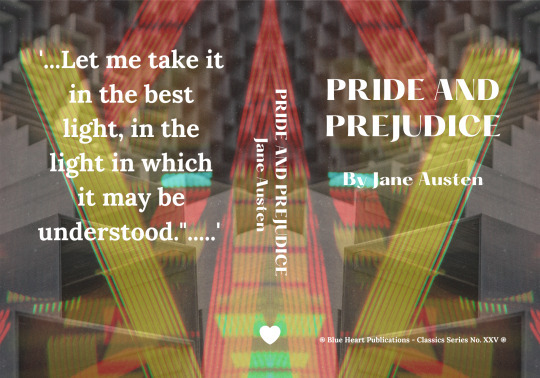
Jane Austen's "Pride and Prejudice" stands as a timeless masterpiece, an exploration of love, social class, and the complexities of human relationships in early 19th-century England. As I delved into the pages of this classic novel, I found myself enchanted by Austen's wit, keen observations, and the enduring relevance of her narrative.
At its core, "Pride and Prejudice" is a love story, but Austen elevates it beyond mere romantic entanglements. The novel unfolds in the world of the landed gentry, where societal expectations and class distinctions shape the characters' lives. Elizabeth Bennet, the spirited and intelligent protagonist, becomes a beacon of Austen's social commentary. The title itself hints at the central themes, highlighting the barriers erected by pride and prejudice that hinder genuine connections between people.
Austen's narrative prowess is evident in her sharp and satirical depiction of the characters. The Bennet family, with its blend of endearing eccentricities and societal foibles, provides a canvas for Austen to explore the absurdities of her contemporary society. Mrs. Bennet's single-minded pursuit of advantageous marriages for her daughters and Mr. Collins's obsequiousness are rendered with a comedic touch, yet they reveal deeper truths about the societal pressures faced by women in that era.
The heart of the novel, however, lies in the dynamic between Elizabeth Bennet and Mr. Darcy. Their relationship evolves amidst misunderstandings, societal expectations, and the prideful assumptions each holds about the other. Austen skillfully weaves a narrative that transcends mere romantic conventions, delving into the intricacies of personal growth, self-awareness, and the transformative power of love.
What sets "Pride and Prejudice" apart is Austen's ability to infuse her characters with authenticity and nuance. Elizabeth, with her sharp wit and strong convictions, emerges as a compelling and relatable heroine. Mr. Darcy, though initially perceived as aloof and arrogant, undergoes a profound transformation, challenging the reader's own prejudices and preconceptions.
Austen's narrative unfolds with a rhythmic cadence, her prose a dance of intellect and emotion. The novel's pacing is deliberate, allowing the reader to savor the unfolding drama and appreciate the intricate web of relationships. The dialogue, filled with social commentary and clever repartees, remains a testament to Austen's literary finesse.
While "Pride and Prejudice" is undeniably a product of its time, the novel's enduring appeal lies in its exploration of universal themes. Austen's critique of societal norms, her championing of independent thought, and her celebration of genuine love resonate across generations. The novel remains a relevant and engaging commentary on the human condition.
In conclusion, "Pride and Prejudice" is a triumph of literature, seamlessly blending romance, social satire, and astute observations on human nature. Jane Austen's legacy endures, and her ability to craft a narrative that transcends its temporal setting cements "Pride and Prejudice" as a timeless classic. As I closed the final chapter, I couldn't help but marvel at Austen's enduring relevance and the indelible mark she has left on the landscape of literary brilliance.
Jane Austen's "Pride and Prejudice" is available in Amazon in paperback 16.99$ and hardcover 24.99$ editions.
Number of pages: 453
Language: English
Rating: 10/10
Link of the book!
Review By: King's Cat
#Jane Austen#Pride and Prejudice#Regency-era literature#Classic romance#Social satire#Elizabeth Bennet#Mr. Darcy#Love and relationships#Class distinctions#Marriage in 19th-century England#Satirical humor#Social commentary#Courtship rituals#Feminism in literature#Romantic ideals#Irony and wit#Manners and etiquette#British landed gentry#Character development#Marriage expectations#Family dynamics#Independent women#Society and morality#Prejudice and perception#Courtly love#Literary realism#Timeless themes#Gentlemanly conduct#Women's role in society#Misunderstandings
2 notes
·
View notes
Text
"Love's Triumph and Social Satire: A Spirited Journey Through 'Pride and Prejudice' by Jane Austen"
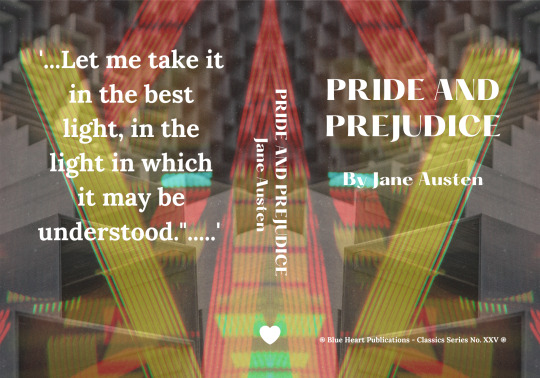
Jane Austen's "Pride and Prejudice" stands as a timeless masterpiece, an exploration of love, social class, and the complexities of human relationships in early 19th-century England. As I delved into the pages of this classic novel, I found myself enchanted by Austen's wit, keen observations, and the enduring relevance of her narrative.
At its core, "Pride and Prejudice" is a love story, but Austen elevates it beyond mere romantic entanglements. The novel unfolds in the world of the landed gentry, where societal expectations and class distinctions shape the characters' lives. Elizabeth Bennet, the spirited and intelligent protagonist, becomes a beacon of Austen's social commentary. The title itself hints at the central themes, highlighting the barriers erected by pride and prejudice that hinder genuine connections between people.
Austen's narrative prowess is evident in her sharp and satirical depiction of the characters. The Bennet family, with its blend of endearing eccentricities and societal foibles, provides a canvas for Austen to explore the absurdities of her contemporary society. Mrs. Bennet's single-minded pursuit of advantageous marriages for her daughters and Mr. Collins's obsequiousness are rendered with a comedic touch, yet they reveal deeper truths about the societal pressures faced by women in that era.
The heart of the novel, however, lies in the dynamic between Elizabeth Bennet and Mr. Darcy. Their relationship evolves amidst misunderstandings, societal expectations, and the prideful assumptions each holds about the other. Austen skillfully weaves a narrative that transcends mere romantic conventions, delving into the intricacies of personal growth, self-awareness, and the transformative power of love.
What sets "Pride and Prejudice" apart is Austen's ability to infuse her characters with authenticity and nuance. Elizabeth, with her sharp wit and strong convictions, emerges as a compelling and relatable heroine. Mr. Darcy, though initially perceived as aloof and arrogant, undergoes a profound transformation, challenging the reader's own prejudices and preconceptions.
Austen's narrative unfolds with a rhythmic cadence, her prose a dance of intellect and emotion. The novel's pacing is deliberate, allowing the reader to savor the unfolding drama and appreciate the intricate web of relationships. The dialogue, filled with social commentary and clever repartees, remains a testament to Austen's literary finesse.
While "Pride and Prejudice" is undeniably a product of its time, the novel's enduring appeal lies in its exploration of universal themes. Austen's critique of societal norms, her championing of independent thought, and her celebration of genuine love resonate across generations. The novel remains a relevant and engaging commentary on the human condition.
In conclusion, "Pride and Prejudice" is a triumph of literature, seamlessly blending romance, social satire, and astute observations on human nature. Jane Austen's legacy endures, and her ability to craft a narrative that transcends its temporal setting cements "Pride and Prejudice" as a timeless classic. As I closed the final chapter, I couldn't help but marvel at Austen's enduring relevance and the indelible mark she has left on the landscape of literary brilliance.
Jane Austen's "Pride and Prejudice" is available in Amazon in paperback 16.99$ and hardcover 24.99$ editions.
Number of pages: 453
Language: English
Rating: 10/10
Link of the book!
Review By: King's Cat
#Jane Austen#Pride and Prejudice#Regency-era literature#Classic romance#Social satire#Elizabeth Bennet#Mr. Darcy#Love and relationships#Class distinctions#Marriage in 19th-century England#Satirical humor#Social commentary#Courtship rituals#Feminism in literature#Romantic ideals#Irony and wit#Manners and etiquette#British landed gentry#Character development#Marriage expectations#Family dynamics#Independent women#Society and morality#Prejudice and perception#Courtly love#Literary realism#Timeless themes#Gentlemanly conduct#Women's role in society#Misunderstandings
3 notes
·
View notes
Text
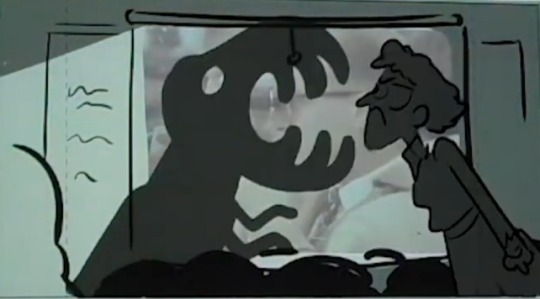
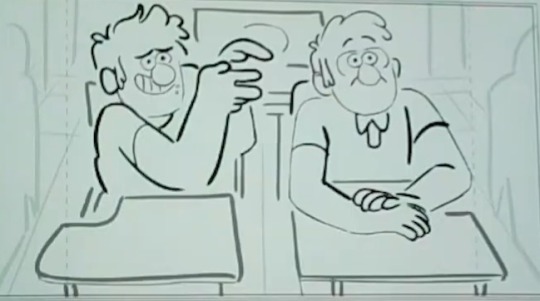
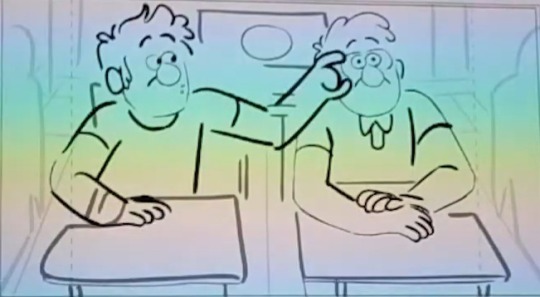
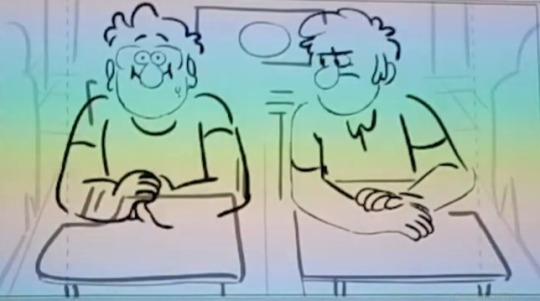
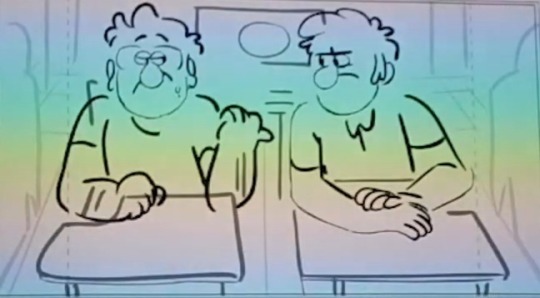
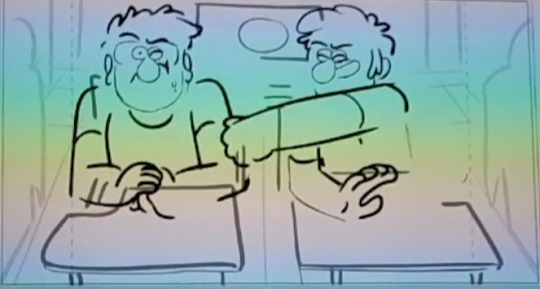
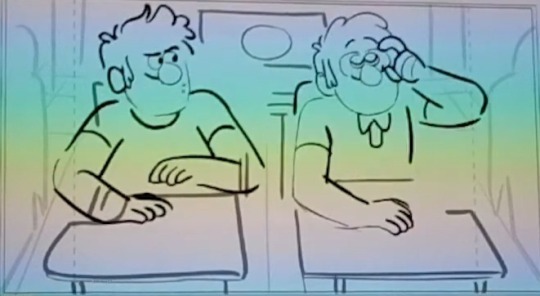
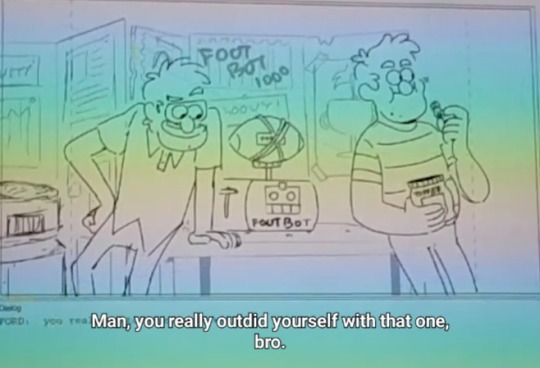
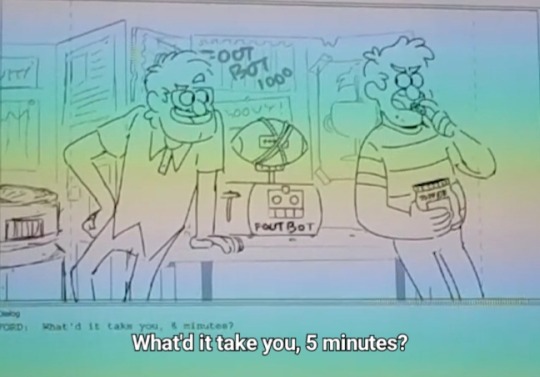
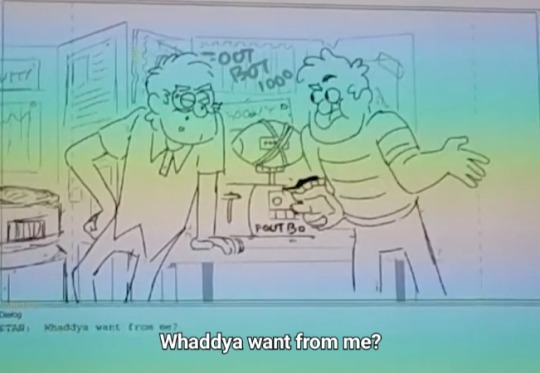
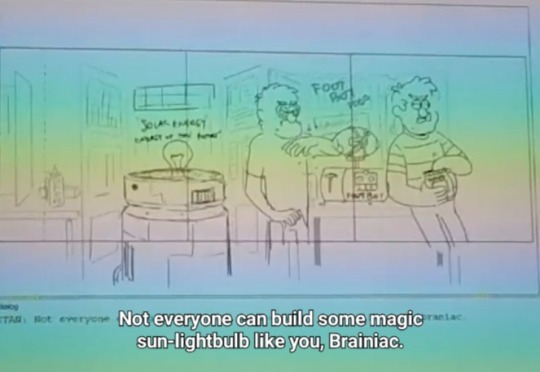
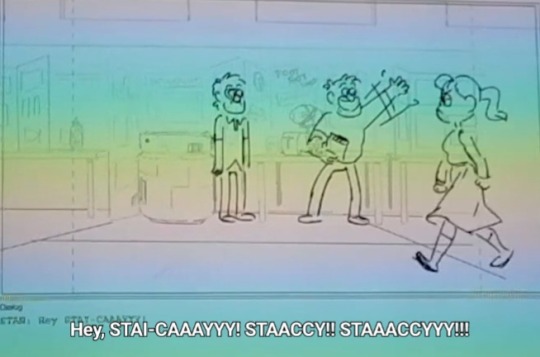
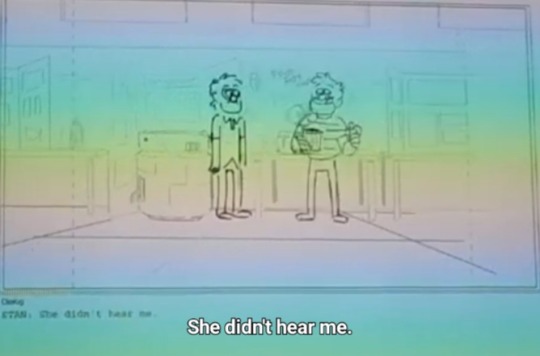

you can see that the script originally had ford building an anti-gravity machine for the science fair (which i guess acts as foreshadowing to the portal?), but the sun lightbulb feels like it would've connected to the opening of stanchurian candidate....

#it probably would've made stan's issues in that ep hit even harder but honestly its not very visually... distinct? impressive? idk#the perpetual motion machine kinda looks like a triangle and probably seems more useful and impressive in comparison tho#and yes footbot is literally a football ducttaped to a toaster#ford pines#stanford pines#stan pines#stanley pines#i do kinda like this version of stan goofing off in class#altho them switching glasses wouldn't work as well with the teen stan design we ended up getting#even still i think briefly showing them doing any type of twin switches is kinda important#with some fans ending up doubting that theyre identical twins lol#but i feel like the scene we got of ford letting him cheat is kinda important to show too#he ain't uptight about rules!!! he didn't mind helping his brother!!!#also its fun that stan likes doing shadow puppets too when he said that ford is super good at them#messy hair stan my beloved
2K notes
·
View notes
Text
also i think harry potter is a more interesting character when you allow james to be extremely morally grey. imo this is more reflective of canon: he was a bully. he was blindly privileged. he harassed lily and treated it like a joke. and no matter what, he's still a man who wanted to marry "the brightest witch of her age" and saw absolutely nothing wrong with making her his jobless prospectless pregnant housewife at 19 years old! that's entitlement!
like in doing this, james technically carried on centuries of misogynist conservative pureblood tradition (marrying women off to be teenaged childbrides) without another thought. this is the environment in which he was raised. and he told himself it was ok and progressive because he, like, wasn't racist to her for being muggleborn and genuinely loved her as a person, or whatever. but that's the bare minimum! and it shows that he had no qualms with participating in pureblood culture & tradition when it suited him, because he literally materially did. a better james potter would never have been comfortable with letting her take on that role.
and the series themes are more resonant when harry's parents aren't both just, like, nebulously ontologically good. it's really poignant when harry spends his entire life being taught to idolize a man who was, in actuality, kind of a piece of shit— and grapples with this as he grows up, ultimately choosing to be different. the lesson is that both good (and cruelty) can come from anyone, regardless of birth circumstances or house placement, because goodness is a choice.
#the no!war drarry au where they bond over having a conflicted relationship with their pureblood fathers...#showing how distinctions like “gryffindor” “slytherin” are functionally meaningless because the REAL evil is hierarchical systemic power#oh im thinking#like genuinely i think harry just has an incredibly strong moral core & lily would have fostered this if he grew up with his parents#he would have idolized his father in childhood (like everyone around him) and then grown up to be actually pretty disgusted by james#he wouldn't stand for that behavior! or those values! and he would have an extremely contentious relationship with his dad. basically#if snape was like “your father is an arrogant toerag” in class then this harry would have been like FACTS!!!! FACTS!!! YEAH HE FUCKING IS#(i think harry still would hate snape for the uh. child abuse. but he can ALSO recognize another james hater regardless 💥💥💥)#saints speaks 🐇
176 notes
·
View notes
Text
I usually say that my judaism looks like conservative judaism since that's what is closest to what I do (and want to do), and also about my general beliefs... but if I'm honest, my judaism is just a tapestry filled with every little thing I adore about judaism. My rabbi described it as a smorgasbord, and that's true, as well, but in reality, I see my judaism as nothing but love
#jumblr#jew by choice#jewish conversion#personal thoughts tag#my judaism is a coat of many colors#this is why i don't really like when my judaism is boiled down just to Conservative Judaism™#the rabbi a couple weeks ago in my ITJ class said that one of my thoughts was almost perfectly aligned with reconstructionism#and i was really happy to hear that. i want people to look at me and see something different each time#just because my judaism is so multifaceted and comprised of so many ideas and people and moments of time#brb i'm going to listen to coat of many colors and cry#i told my rabbi that if i could i would make it so that i never had to 'know' the distinction between movements#obviously i do respect each movement. it's just that sometimes i feel like it prevents people from seeing the full picture?#it's hard to describe#i have many thoughts about the song coat of many colors too but that's neither here nor there perhaps
148 notes
·
View notes
Text
I understand that literature nerd Jason Todd is kind of overblown in fanon compared to it's actual presence in canon (a few issues during his pre (and post?)crisis Robin tenure that highlight it) BUT consider that I think it's hilarious if the unhinged gun toting criminal has strong opinions on poetry
#ramblings of a lunatic#dc comics#Jason Todd#batfamily#it's just a fun quirk! it's a fun lil detail and I simply cannot slight ppl for enjoying and incorporating it into works#like obviously jason isn't the only one. I'm a big believer in the batfam having over lapping interests they refuse to bond over#i know dick canonically used the robin hood stories (which are pretty flowery in their language far as i can tell) as inspo for Robin#and i know babs was a librarian and even tho her area of nerddom is characterized as more computery she probably knows quite a lot-#-about literature as well#duke is a hobbyist writer i believe? i saw a fan mention that- which if so is great and I hope he's also a nerd#(i mean he is canonically. i remember him being a puzzle nerd in his introduction. but i mean specifically a lit nerd)#damian called Shakespeare boring but also took acting classes so i think he's more of a theatre kid.#Tim's a dropout and i don't think he's ever shown distinct interest in english lit and i can't remember for Steph?#I'm ngl my brain hyperfocused on musician Steph i forget some of her other interests I'm sorry (minus softball and gymnastics!)#and then Cass had her whole (non linear but it's whatevs) arc about literacy and learning to read#went from struggling to read in batgirl 00 to memorizing Shakespeare in 'tec and is now an avid read in batgirls!#she's shown reading edgar allen poe but we don't know if it's his short stories or his poems#point to all of the above being: i know Jason's not the only lit nerd in the batfam#but also i do need him to be writing poetry in his spare time and reading and reviewing it#jason at the next dead robins society meeting: evening folks today I'll be assigning all of us poems based on laika the space dog#damian and steph who have been kidnapped and brought to jasons warehouse to hangout: LET US GO BITCH#speaking of^ random poem i think jason would like: space dog by alan shapiro#wake up one morning in an unfamiliar more mature body with a profound sense of abandonment. the last four lines. mmm tasty
572 notes
·
View notes
Note
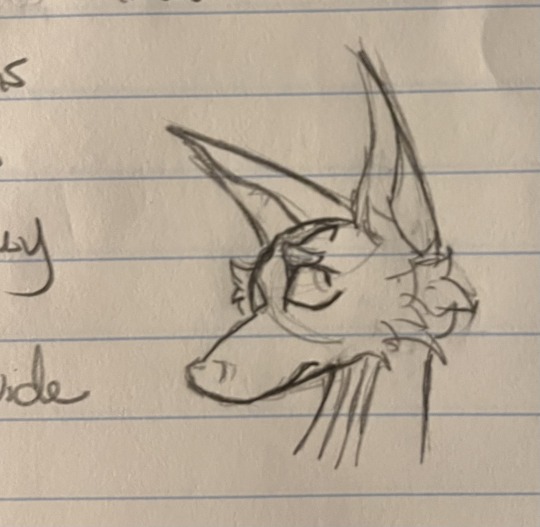
Nervous Machete from my class notes!
we were learning about the spread of christianity.
.
#he seems very concerned about the spread of christianity#I never thought about this but are you guys out there in class and work drawing Machetes from memory?#if that's the case you have good visual memory this has such distinct likeness#another excellent specimen to add to my collection of tiny margin/scrap paper/post-it note Machetes#thank you!#gift art#wacky-nameless-inventor-24#own characters#Machete
354 notes
·
View notes
Note
And also, like…
Yes, it is possible that the Green brothers are masterfully hiding their True Beliefs™️ and are actually fiendish hypercapitalist wannabe-lords.
But this seems extremely unlikely.
While it is indeed important to be careful about ascribing your own motives and beliefs to people in positions of some power or influence, the idea that the moment someone, in our current system, crosses the (apparently hard, bright, and inflexible) line between Fellow Worker and Evil Boss, they should be vilified and treated as no different from, say, Jeff Bezos, regardless of their beliefs and politics? It’s absurd.
It’s in a category of thinking that attempts to place certain principles at the core of everything, without clearly examining either what those principles actually entail, or why they exist in the first place.
I was raised to believe, as Lois Bujold’s character Miles Vorkosigan so succinctly puts it, in “persons over principles.” No matter how important a principle is, if it leads you to lose sight of the actual human beings involved, then you have lost your way.
The majority of professional YouTubers, particularly the more established ones, are bosses. Their economic interest rests on their ability to exert coercive power over their employees, including the coercive threat of homelessness. When they post about politics it's important to remember they aren't doing so from an uninvested position.
Look at it this way, if a packer at a DFTBA warehouse came to Hank Green saying their rent had increased and they could no longer afford it do you think he'd offer them a raise or more hours?
I mean tbf Hank Green is roughly as representative of youtubers as, I don't know, Taylor Swift is of musicians. Really, really riding the far edge of the power law line.
So like
When they post about politics it's important to remember they aren't doing so from an uninvested position.
is of course entirely correct, but I'm pretty sure the average 'pro' youtubers invested economic position is the desperate need to ride the algorithm and avoid pissing off BetterHelp or whoever's still buying ad reads on video essays these days. Making enough money to have employees is a, like, .01% thing.
249 notes
·
View notes
Text
Her last words lingered in his mind. The shadow of eternity! Rich people, who could afford to cultivate their emotions, talked like that.
L. P. Hartley, from The Hireling
#highfalutin#pretentious#dramatic#indulgent#rich people#rich#class distinctions#class issues#class#generalizations#overdramatic#indelible#made an impression#reminds me of#the philosopher's pupil#quotes#lit#words#excerpts#quote#literature#emotional life#emotions#l. p. hartley#the hireling#resentful
12 notes
·
View notes
Text
I was confused at first why they were being killed one by one because that didn't really make sense and then I realized it's because last names are what they are born with. Last names can dictate influence, especially when it comes to wealth. Lindy used her last name as an advantage over Ricky because September was just a stage name- his last name came before hers so he had to die first. I think it's interesting that something so simple is actually so complex and no wonder the Doctor was so confused by it. The dot used what so many rich people take for granted (their last name) in order to punish them for it.
#this episode ahhhh like theres so many facets#class distinction alone i could write paragraphs on#doctor who#lindy pepper bean#dot and bubble#dw#dw analysis#the doctor#ruby sunday#my posts
129 notes
·
View notes
Text
like. okay yeah I have my own criticisms of bourgeois academia as an instrument of class rule, but some of this is a bit silly. a lot of people are acting as though academia refers solely to like, literature degrees.
like at a fundamental level, yes, the purpose of a degree is as a barrier to access - but that is not in and of itself always a negative thing! the proletariat also requires the ability to produce, assess, and verify intellectuals. all the 'why the fuck should I care if the student across from me cheated on their tests, never attended class, etc' talk falls apart when the question being answered by their possession of a degree is 'should this person be permitted to design and construct buildings'! fundamentally, yes, someone cheating on their exams devalues a degree, because the confidence in qualification granted by that degree is lessened - not to mention the inherent danger of a fraudulent qualification! (strangely, this argument hasn't been extended to driving license exams yet, though I'm sure the inevitable libertarian convergence isn't far away.)
in all the discussion of burning down the local polytechnical, i have seen vague mention to academia existing as a barrier to access, some scant reference to discrimination against poor and minority students, but zero mention of the actual role of bourgeois academia and the intelligentsia in upholding bourgeois rule! it's all simply coming from the point of view of the restrictiveness being bad because it prevents people from getting high-paying jobs or the like, and the vague notion of elitism. again, with all abolition discourse here, given the lack of any real class analysis, the question is - are we talking solely within the context of capitalism, of existing bourgeois institutions? if so, why? why limit our positions to capitalist realism, to an essentially liberal discourse? if not - then how have we not reconciled the real, practical value of these technologies (mass education, examination, qualification) with their specific characteristics under capitalism?
everything has both positive and negative aspects. bourgeois class rule itself, even, was once a truly progressive thing. we can acknowledge the negative side of bourgeois academia without ignoring its positive side - and still take it on the whole that it, along with all bourgeois institutions, should be torn down and replaced by proletarian ones. that, stripped of their capitalist character, these are useful barriers.
Fundamentally, the point is this: why is our focus on attacking the barriers keeping us from class mobility, from high-paying jobs, themselves; instead of on attacking the existence of the high-paying, middle-class jobs that themselves characterise a fundamentally useful, practical system like examination as an instrument of class rule?
#this is coming from a mentally ill student with good aptitude and passion for my subject but an intense difficulty with examinations#like yes on the one hand the structure of existing academia serves as a means of enforcing class distinction and is inflexible as such.#but also.#i should not be allowed to do work i cant prove im qualified for. no amount of change to the structure of the institution changes that
415 notes
·
View notes
Text
i joke that rev period america was just 20 people in a circle recycling reusing periodic beef with each other but holy shit the same names every single goddamn time. von steuben wtf were you doing at the doctors' riot of 1788. hercules mulligan you exist in a different stratosphere from the adams family, why is your son involved with john adam's son. von steuben and hamilton why are you involved in this as well. aaron burr why are you maria reynold's lawyer. can i expect jefferson and madison in a trenchcoat to jump out of the bushes or what.
#on a serious note this shows that early america decidedly had class distinctions. it wasn't this democratic utopia.#a very select portion of the population could vote. not even all white males.#so it makes sense that the same privileged group keeps fighting and running into each other but damn#new york especially was like 5 people in a trenchcoat i think#amrev#alexander hamilton#amrev fandom#charles adams#hercules mulligan#john mulligan
139 notes
·
View notes
Text
Let's talk about Henry's accent. (Fair warning: I'm not a linguist, these are just my thoughts.)
Henry has a proper English country accent, and to my ear is from somewhere in the Midlands, though not as far west as Birmingham. There's a lot of classism associated with accents in Britain: people often 'smooth' out their accents so as to fit in — a study in 2022 found 46% of adult respondents had been mocked or singled out for their accents in social situations. Henry's accent belongs to someone who is rural and working class, exactly as it should be. But to my knowledge, it's not often you get a protagonist with a rural or working class accent, such as Eggsy in Kingsman, — and when you do (such as Tommy Shelby in Peaky Blinders), it's often associated with criminality, a bias that exists in real life too. It would have been easy for KCD to have a Henry with a more generic accent (think Geralt in the Netflix Witcher), but instead we get him speaking in an accent that reflects his upbringing and class, and it's fantastic.
#kingdom come deliverance#henry of skalitz#anyways: thank you Tom McKay for your lovely voice#if anyone has more precise regional opinions on Henry's accent lmk#I've seen people say it's West Country but it's a bit further north imo#Henry's accent is particularly great against Hans' more upper class accent#(but even there we have some distinction because Hans' accent isn't super upper class RP)#part of me wants to write a modern AU set in Britain just to explore the whole class dynamics#(and partly because I want to put Henry as a working class boy at Oxbridge but that's my own personal experiences talking)#(not as someone working class but as an outsider at Oxbridge)#(ie. Saltburn but it actually has something to say about class dynamics and also less murder)
31 notes
·
View notes
Text
i wish i knew what to call the specific discrimination appalachians face
cuz like
it isnt racism, appalachians dont form a distinct racial category
but it isnt accurate to call it classism, the discrimination we face is influenced by, but distinct from the perception of appalachians as exclusively working class
and even in working class spaces i find my culture to be singled out, and that most non appalachians ive met consider the region an acceptable target of prejudice and ridicule, regardless of class background
nativism, nationalism, and xenophobia all dont really work in analysis
my girlfriend suggested the term "locational prejudice"
but that isnt a particularly useful term if your goal is to dismantle said prejudice, its clunky and an ineffective phrase for communication
#projecting my thoughts#it is something ive consistently noticed#anti appalachian prejudice is almost ubiquitously flattened as 'classism'#but appalachians are not a distinct class from the rest of the working class#however even in working class spaces i find that my accent diminishes my perceived intelligence#my perceived kindness/safety as well#and my culture is seen as acceptable to paint as primitive#barbaric#incestuous#backwards#etc
58 notes
·
View notes
